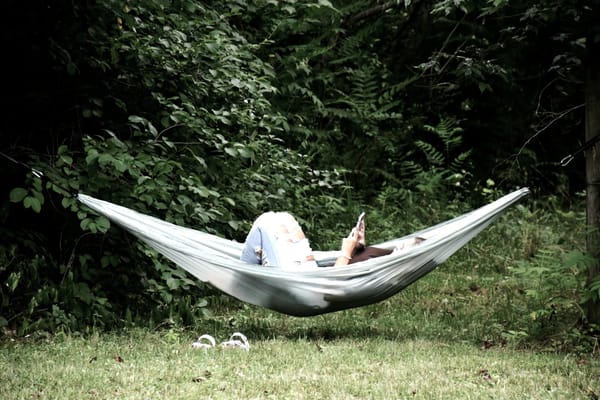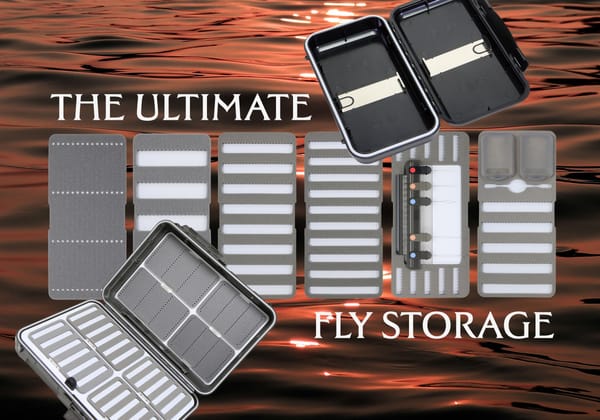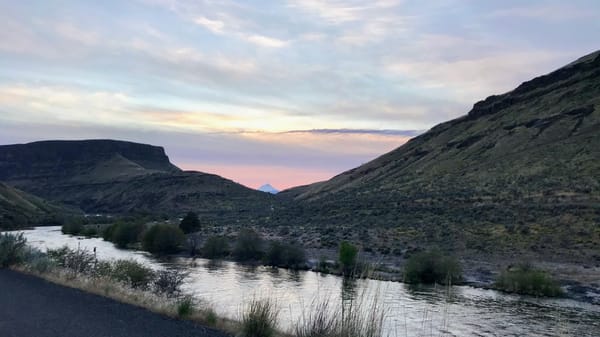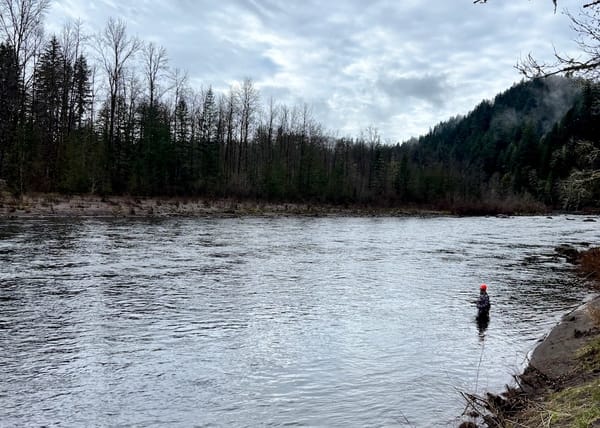Big swell off Point No Point
Routines, purposelessness, wrist action, and our Member Drive fish reveal

Current Flowers of State: When we talk about building our fly fishing practice, and exploring fly fishing as a creative act, what do we mean?
In part, we mean setting standards and acting in a disciplined way according to those standards. And in part that means a routine, but a routine to arrive at nothing in particular. Just presence with sport, the river, the cast, the fly, the fish. Allow me a quick digression to make a more fundamental connection.
Jock Sutherland is one of the world's most famous and accomplished surfers. Last year, in a New Yorker profile of Sutherland, William Finnegan, himself one of the world's most famous and accomplished surfing writers, made an astute observation.
To set the scene, Sutherland and Finnegan had just finished a surfing session together, where the latter was blown away by the older man's style and grace on the waves.
In Jock’s world, you find the hose under the bushes behind the old house, then wash the salt off not only your body but your board. (That’s new.) You wrap the leash just so around the fins or, better, remove it from the board entirely, coil it carefully, and then dry the board with a towel. (Also new.) Then, if necessary, you rub the bottom of the board with a foam-filled nylon sock called a Pickle. (A Pickle?) Then you slip the board gently into an immaculate bag, and slip all that gently into the van.
There’s more. As you wrap a beach towel around your waist to change, be careful to keep your feet free of dirt. There’s a designated little rug to stand on, and a rag to clean your feet. And, speaking of feet, cross the yard only at certain angles, because some patches of the grass have sharp little stickers. Wet trunks and rash guards go in a special bucket.
I resist all this rigmarole the first few times we surf together. Jock shakes his head in pity and disapproval. Then, one day, I decide to do everything his way, just for the hell of it. Rinse the board, dry the board. Wet trunks in the bucket. The rituals are oddly soothing. It’s the upside of O.C.D.—everything in its place. These boards will last forever the way we’re treating them.
“Now you’re gettin’ it, Bill.”
To make a vast understatement, Zen in the Art of Archery, by Eugen Herrigel, is about more than archery. Most immediately, it's about any bodily pursuit. More broadly, it's about being and doing in the world. I include fly fishing in both of these categories. We are attempting, through pursuit of mastery, to transcend the "sportness" or "hobby" nature of an ancient, tool-based human subsistence method to touch what's deeper, which is variable and deeply personal.
When Herrigel describes the teacher's approach to instructing students across a variety of arts, he is describing the teacher creating an impression of the proper routine on the learners. Emphasis mine.
And what impels him to repeat this process at every single lesson, and, with the same remorseless insistence, to make his pupils copy it without the least alteration? He sticks to this traditional custom because he knows from experience that the preparations for working put him simultaneously in the right frame of mind for creating. The meditative repose in which he performs them gives him that vital loosening and equability of all his powers, that collectedness and presence of mind, without which no right work can be done.
Jock Sutherland was raised—taught—by his mother, Audrey Sutherland, an incredibly disciplined force of nature in her own right. She is known in part for her solo paddling across the Hawaiian islands and Alaska in kayaks and canoes, dangerous and desolate adventures.
As Finnegan writes, Sutherland brought a level of discipline to inculcate ritual in her four children.
Audrey drew up a list of things that every child should be able to do by age sixteen and stuck it on the wall. It read, in part:
—Clean a fish and dress a chicken
—Write a business letter
—Splice or put a fixture on an electric cord
—Operate a sewing machine and mend your own clothes
—Handle a boat safely and competently
—Save someone drowning using available equipment
—Read at a tenth grade level
—Listen to an adult talk with interest and empathy
—Dance with any age
This list changed with the times, adding computers and contraception, and nobody really kept score, but everybody got the idea.
Discipline, ritual, routine, practice. These are all synonyms for a level of seriousness and contemplation we aspire to bring to this art.
Does this mean fly fishing should be dour and serious? Absolutely not. The opposite. Here's Herrigel again, emphasis on purposelessness:
Even if the pupil does not, at this stage, grasp the true significance of his shots, he at least understands why archery cannot be a sport, a gymnastic exercise. He understands why the technically learnable part of it must be practiced to the point of repletion. If everything depends on the archer's becoming purposeless and effacing himself in the event, then its outward realization must occur automatically, in no further need of the controlling or reflecting intelligence.
Ours go to eleven: Christopher Guest and his fly fishing practice
This thinking crystalized this week when I heard renowned writer and film director Christoper Guest appearing on the Marc Maron podcast this week. Toward the very end (around 1:26), the two talked about Guest's fly fishing. You may know Guest from his impressive resume of satirical comedies including This Is Spinal Tap, Best In Show, Waiting For Guffman, and many more.
I'm cutting out a lot of the Maron-isms, but here's Guest talking about his fishing practice, which is anchored in two key things: routine, and enthusiasm for its own sake. You kind of have to hear it in the audio, but the incredibly articulate Guest, whose living is words, the musicality of voice, the literal music he creates, struggles for phrases when attempting self-analysis around his "hugely deep" thing in fly tying, and how he "doesn't know how to" around spiritual aspects of fishing.
MM: But I think this fly-tying thing, because when I texted you, I mean, not only did you say fly-tying, tying flies, but you had specific types of flies. Is this a real thing for you?
CG: It's so deep. It's hugely deep. Okay. So this is another thing I do every single day. So the day is, I wake up, I read six newspapers roughly. I exercise for an hour. I have a gym where I can do different things, and I rotate through those things. I do that because I need to keep fit-ish because I walk in rivers a lot and I ski and I do a lot of outdoor sort of things.
CG: I started tying flies 40 years ago. And after I work out, I then tie flies for an hour and then I'll play music and then I'll have lunch and then I'll do it again in the afternoon. Different patterns. But I have thousands, I tie 3,000 flies a year. You look worried. The thing is, for people who do that, it's totally, you can't explain because, you know, but I've done this for a long time and I use them and I give them away to people. And they've been successful and that's really fun when something works.
MM: So you invent your flies.
CG: Some, I have, but it's more about doing them well and doing a really good job of, or even if it's an offshoot of something. And doing them well and they work and they last and they're kind of cool.
MM: So you've got organizers full of feathers?
CG: Oh, no, I have an entire workstation of that stuff. Drawers, thousands of threads, thousands of feathers, yes. And I can swivel around and my music thing is right there. Literally in a chair and I can swivel and then record behind me, so I can do both in my office.
MM: It's like the two worlds. It's the world of control and the world is free-form.
CG: And it's fun, it's fun every time I do that. It's fun.
MM: And do you fly fish?
CG: A lot.
MM: Yeah?
CG: Oh, yeah.
MM: Where do you go?
CG: Well, we bought a house, we built a house on a river 40 years ago. And I've gone all over the world, but I travel with a friend and we camp out in the wilderness on rivers. And I pull this little trailer thing, he sleeps in this little trailer, I sleep in my truck thing, I'm leaving tomorrow to do it. And I do this a lot. And have for since '85, I guess. So it's a big part of what I do.
MM: And is it, I don't want to use the word spiritual or meditation or anything else. The pace-
CG: No, I think that, no, and people say that must be very Zen or there must be something. I don't know how to, I always liked being in the outdoors. And this was this weird thing growing up in New York City where I only wanted to be in the mountains. And I got to do that when I was a kid, I would go away and have chances to do that and ski. And I was never happier than that.
Routine, purposelessness, doing the thing for its own sake. Tying thousands of flies a year to give them away. Sleeping in the back of your truck. Fishing for the fun of it. A creative person at the top of their game, on the biggest stage, with these simple pursuits. There's a profound sense of purposelessness here. When Maron probes on the spiritual aspects, Guest downplays it as a pursuit to that end. "I always liked being in the outdoors."
In Best in Show, which he also wrote and directed, Guest played coonhound fancier Harlan Pepper, who in addition to earnestly loving nuts and ventriloquism, loves fly fishing. In one scene he dispenses probably the most legitimately authentic piece of fly fishing-related dialogue ever uttered in a movie, to a disgusted and distracted Meg and Hamilton Swan (Parker Posey and Michael Hitchcock), the neurotic yuppies searching out the ever-unattainable Busy Bee.
Harlan Pepper: Some people think, you know if you're on a small creek, a small body of water, that you have to use a small fly. But I've been in many situations, even on a big river, where I'm using a size 18, a size 20, a size 22. And I go with a dropper. Sometimes I go with a Parachute Adams or maybe I have a little PT Nymph on the end. And you could hook a big fish. A lot of people don't realize that. They think you have to go with a Woolly Bugger or Sculpin pattern of some kind. Maybe an Egg-Sucking Leech or something, which I've never had any luck with myself.
Hamilton Swan, interrupting: Is that L.L. Bean?
Harlan Pepper: Huh?
Hamilton Swan: Is this L.L. Bean?
Harlan Pepper: This'n?
Hamilton Swan: Can I check?
Harlan Pepper: I don't know.
Meg Swan: Oh, Hamilton
Hamilton Swan: I'm just checking.
Purposelessness in action, interrupted by a fashion question. If this isn't an accurate metaphor for contemporary fly fishing, I'll eat one of those $700 bespoke influencer-branded pure beaver felt fishing hats.
It's (not) not in the wrist
Fall Term class starts this week. Next newsletter, we'll be welcoming a whole new crew of Intro to Fly Fishing alums. In getting ready for class I'm reminded of one beginner thing new casters almost always have trouble with: Their wrists.
There's one great way to get feedback on whether or not you're using too much wrist, if you don't have me standing over your shoulder barking at you. If you've casted with me before, you might have been asked to don the "cuff of shame". Read on for more about the wrist's complex role in a fly cast, and what to make of it as you're just getting started.

September Member Drive update: Guess the fish to win a great prize!
We're in the home stretch of our September Member Drive, and I have an exciting update: With four new paid members joining, we've revealed enough of our mystery fish for our guessing game to open.
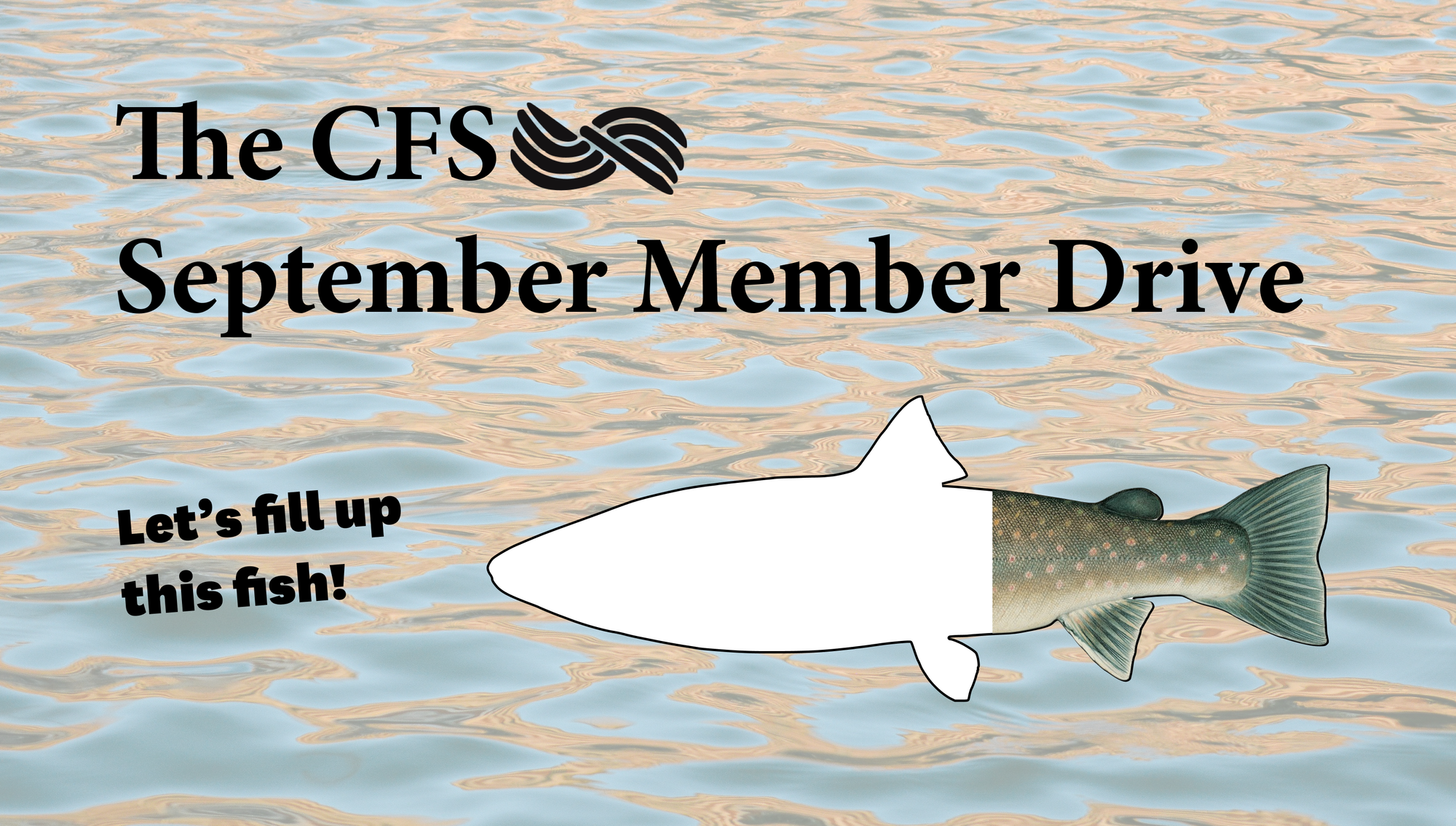
The first one to reply to this email with the correct identification of the mystery fish species will get a fun prize from me in the mail. So, take a look, make a guess, and send me a note to win! I'll update y'all on the winner and the special prize later this week.
Don't forget, we're aiming at 10 new paid members this September Member Drive. We have four so far. Not great, Bob. If you're considering helping out, now's the time to support the program and invest in your angling. Join the inner circle and helping fund equipment like our classroom Photarium.
That's it for this week! Current Flow State is a weekly newsletter from me, Nick Parish.
What kind of flies do you think Christopher Guest loves to tie? Tell me on Bluesky 🦋, Instagram 📸, YouTube 🎥, or the Fishcord 💬.
If you enjoyed this, please share it with a friend. We all need more fishing buddies. 💌
Read our editorial policy or browse the newsletter archives.
CFS members support and sustain the site, and our community. Learn more about membership benefits. If you're getting value from this work, consider becoming a member and giving back.
𓆟 𓆝 𓆟


